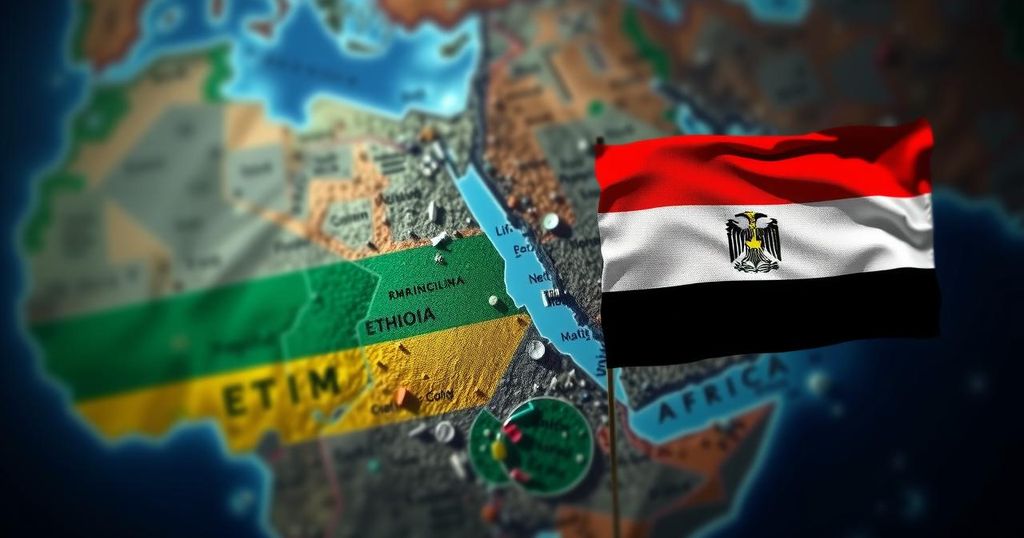In October 2023, the presidents of Egypt, Eritrea, and Somalia met in Asmara, forging military alliances in response to Ethiopia’s heightened regional influence following the establishment of the GERD and recognition of Somaliland. Egypt seeks to counter Ethiopia’s ambitions and restore its lost standing in Africa through strategic military and diplomatic partnerships, amid escalating concerns over water security in the Nile Basin.
In early October, the presidents of Egypt, Eritrea, and Somalia convened in Asmara for a trilateral summit focused on regional cooperation. During this meeting, the leaders committed to bolstering Somalia’s counterterrorism capabilities, promising to deploy troops under the auspices of the African Union (AU). This strategic alliance among the three nations has been interpreted by observers as a direct response to Ethiopia’s escalating influence in the region, particularly following Ethiopia’s January agreement to lease territory along its coast to the self-declared republic of Somaliland in exchange for its recognition of Somaliland’s independence. Egypt has long been embroiled in a diplomatic standoff with Ethiopia over the Grand Ethiopian Renaissance Dam (GERD), which Cairo views as a potential threat to its national security. The recent implementation of the Entebbe Agreement—an accord designed to manage the Nile River’s resources—has heightened concerns in both Egypt and Sudan regarding their water security. As outlined by Iman Abdel Azim, a political science professor at Cairo University’s Institute of African Studies, the Asmara summit reflects Egypt’s concerted efforts to strengthen its alliances within Africa by fostering high-level diplomatic and military partnerships. Since 2019, Cairo has prioritized closer ties with African nations, resulting in significant military engagements, such as a joint military defense agreement with Somalia in August 2023 and an agreement with Eritrea aimed at mutual defense. Military collaboration between Egypt and neighboring countries has intensified, as exemplified by Egyptian arms shipments to Somalia within a short time frame. These actions clearly signal a shift toward more militaristic and security-oriented relations in Egypt’s foreign policy, as identified by Amani El-Tawil, Director of the African Program at the Al-Ahram Center for Political and Strategic Studies. The situation surrounding the GERD remains particularly contentious. Abbas Sharaky, a Cairo University water resources professor, emphasized the adverse impacts of the dam on Egypt’s water supply. He stated that every cubic meter stored in the GERD has diminished Egypt’s water availability, forcing Cairo to resort to its reserves from the Aswan High Dam. Despite Egypt’s efforts to negotiate with Ethiopia over the past decade, Ambassador Mona Omar remarked that ongoing discussions have reached an impasse, leaving Egypt with few viable alternatives. Ethiopia’s strategic maneuvers include advancing military ties with countries within the Nile Basin that could further threaten Egypt’s interests. Historically, Egypt’s influence within Africa has waned since the time of former President Gamal Abdel Nasser. Following an era characterized by substantial Egyptian support for African independence movements, subsequent leaders shifted focus away from Africa, resulting in diminished diplomatic engagement. Recent developments, however, indicate a potential resurgence of Egyptian diplomatic efforts aimed at reclaiming its stature in the region. Ethiopia’s recent actions, such as its potential establishment of a military base in Somaliland, have also intensified the rivalry. As highlighted by experts, these developments have resulted in paradoxical outcomes, wherein Ethiopia’s gestures of recognition towards Somaliland are perceived as indications of expansionist tendencies rather than cooperative engagements, causing realignments among neighboring countries toward Egypt. The dynamics in the Horn of Africa are evolving, with Egypt actively seeking alliances in response to the perceived threats posed by Ethiopia’s ambitions. This situation represents a critical juncture in the relations among nations in the region, as military alliances form and reshape the geopolitical landscape.
The geopolitical climate in the Horn of Africa has intensified as Egypt pursues alliances to counter Ethiopia’s growing influence, particularly regarding the management of the Nile River’s resources. The primary contention arises from the construction of the Grand Ethiopian Renaissance Dam (GERD) by Ethiopia, which Egypt views as an existential threat to its water security. Egypt’s historical role as a regional leader has diminished over the decades, coinciding with shifting political priorities and reduced engagement in African affairs. As tensions escalate, regional summits and military agreements represent Egypt’s strategic efforts to strengthen its position against Ethiopia’s unilateral actions and rally support from neighboring nations.
In summary, the recent trilateral summit in Asmara marks a significant development in the evolving alliances in the Horn of Africa. Egypt’s strategic military partnerships signal a proactive approach in countering Ethiopia’s expansionist policies, particularly relating to the GERD crisis. The continued geopolitical shifts in the region necessitate close monitoring, as they may fundamentally alter the balance of power and influence among these nations.
Original Source: www.newarab.com







